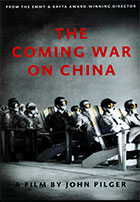
The Coming War on China 2016
Distributed by Bullfrog Films, PO Box 149, Oley, PA 19547; 800-543-FROG (3764)
Produced by Secret Country Films
Directed by John Pilger
DVD, color, 113 min.
High School - General Adult
Agriculture, Business, Economics, Politics
Date Entered: 05/14/2018
Reviewed by Michael J. Coffta, Business Librarian, Bloomsburg University of PennsylvaniaAs China reclaims islands in the South China Sea, the US is bolstering its presence in the Pacific with its “pivot to Asia.” The US has increased its number of bases and arms in the Philippines, South Korea and Japan.
Award winning director John Pilger narrates and is featured in his film, The Coming War on China, interviewing government officials, pundits, scholars and authors, and delivering monologues. In the first “act” of film, Pilger skillfully explores long standing US interests in the Pacific, and the grounds upon which an anti-US military movement could be conceived. The US has a long history of nuclear weapons testing in the Bikini Islands, and strategic positioning of its military bases in order to maintain access to Asia, and potentially control the flow of materials to and from China.
The film details the uneasy relationship between China and the US, citing the 1882 Chinese Exclusion Act, the opium trade, the Boxer Rebellion, and the 1949 Communist Revolution. At each step, Pilger exposes shady motives and practices by both powers. For example, China used the income from the opium trade to industrialize, while unscrupulous American opium traders built political dynasties.
Few films are this bold. Pilger has a dramatic and authoritative tone, and topples misconceptions about US-China relations. For example, he posits that Mao Tse-tung always wanted a partnership with the US in industrializing China. He is not afraid to use damning language, such as “rape” and “savagery,” when describing US conduct and policy. The audience leaves this work with stirring postulates such as “In the US, the [leading] party changes, but the policies do not; in China, the party does not change but the policies do”, and “China has matched the US in its own great game of capitalism.” Despite the film’s ominous title, the film ends on an interesting note, claiming that no other pair of countries are currently more interdependent than China and the US.
This is a timely documentary, and comes highly recommended for its creation of deep historical context, and unflinching assertions and proposals.